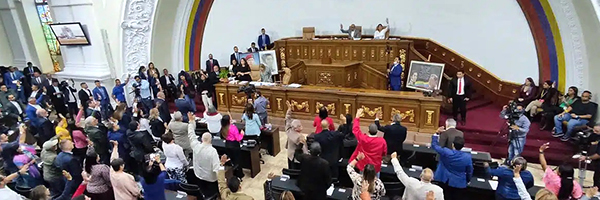Venezuela’s National Assembly Unanimously Approves New Anti-Corruption Legislation
 Orinoco Tribune, April 28, 2023 —
Orinoco Tribune, April 28, 2023 —
Venezuela’s National Assembly (AN) unanimously approved the Organic Law of Asset Forfeiture, which is set to expedite the disposal of assets seized from criminals involved in corruption, terrorist activities, and drug-trafficking, to be used to serve the needs of Venezuelan citizens.
In its second discussion this Thursday, April 27, after an open and public consultation process, as well as correcting some articles and expanding the definitions of some specific concepts, the deputies of the Venezuelan parliament gave the go-ahead to the legal instrument.
“I feel very happy to declare the Organic Law of Asset Forfeiture passed,” announced Jorge Rodríguez, the president of the AN.
The head of the legislative branch further congratulated the Parliament’s Permanent Commission on Domestic Policy, headed by Deputy Diosdado Cabello, for its “clear, pristine, firm strategy; managing with a criterion of urgency and speed in the drafting and consultation process” in regard to this new law, which he considered “very important in the fight against corruption in Venezuela.”

The congratulations were also extended to the legislators who, “regardless of their political ideology,” Rodríguez said, “worked together to approve this law with the haste that the case demands.”
Special commission
The AN president announced the creation of a special commission, made up of deputies from the Internal Policy, Comptrollership, and Economy commissions, for the purpose of reviewing the Venezuelan legal framework on corruption.
Rodríguez asked this commission, which will be chaired by Diosdado Cabello, to utilise the same “haste” he had referenced earlier, in this process of reviewing the existing legal framework, “to make them more energetic and efficient in the fulfillment of their goals.”
The head of the AN continued his statement, explaining that the objective is to avoid impunity being “the currency of use by the corrupt,” or “by people belonging to the private sector who are also corrupt.”
